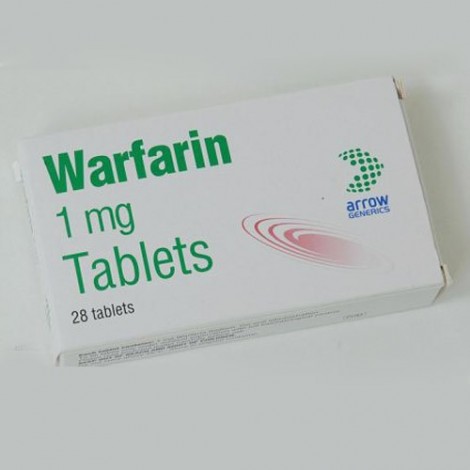Coumadin (Warfarin) Information.
Warfarin (also known by the brand names Coumadin, Jantoven, Marevan, Uniwarfin) is an anticoagulant normally used in the prevention of thrombosis and thromboembolism, the formation of blood clots in the blood vessels and their migration elsewhere in the body, respectively. It was initially introduced in 1948 as a pesticide against rats and mice, and is still used for this purpose, although more potent poisons such as brodifacoum have since been developed. In the early 1950s, warfarin was found to be effective and relatively safe for preventing thrombosis and thromboembolism in many disorders. It was approved for use as a medication in 1954, and has remained popular ever since. Warfarin is the most widely prescribed oral anticoagulant drug in North America.[3]
Despite its effectiveness, treatment with warfarin has several shortcomings. Many commonly used medications interact with warfarin, as do some foods (particularly leaf vegetable foods or "greens," since these typically contain large amounts of vitamin K1) and its activity has to be monitored by blood testing for the international normalized ratio (INR) to ensure an adequate yet safe dose is taken.[4] A high INR predisposes patients to an increased risk of bleeding, while an INR below the therapeutic target indicates the dose of warfarin is insufficient to protect against thromboembolic events.
Warfarin and related 4-hydroxycoumarin-containing molecules decrease blood coagulation by inhibiting vitamin K epoxide reductase, an enzyme that recycles oxidized vitamin K1 to its reduced form after it has participated in the carboxylation of several blood coagulation proteins, mainly prothrombin and factor VII. Despite being labeled a vitamin K antagonist,[4] warfarin does not antagonize the action of vitamin K1, but rather antagonizes vitamin K1 recycling, depleting active vitamin K1.[5] Thus, the pharmacologic action may always be reversed by fresh vitamin K1. When administered, these drugs do not anticoagulate blood immediately. Instead, onset of their effect requires about two to three days before remaining active clotting factors have had time to naturally disappear in metabolism, and the duration of action of a single dose of warfarin is 2 to 5 days. Reversal of warfarin's effect by discontinuing its use, or by administering vitamin K1, requires a similar period of time.
Coumadin (Warfarin) Side Effects
As well as its needed effects, warfarin may cause unwanted side effects that require medical attention.
If any of the following side effects occur while taking warfarin, check with your doctor immediately:
Less common
- Abdominal or stomach pain with cramping
- bleeding gums
- blood in the urine
- bloody stools
- blurred vision
- burning, crawling, itching, numbness, prickling, "pins and needles", or tingling feelings
- chest pain or discomfort
- confusion
- coughing up blood
- difficulty with breathing or swallowing
- dizziness, faintness, or lightheadedness when getting up suddenly from a lying or sitting position
- excessive bruising
- headache
- increased menstrual flow or vaginal bleeding
- nosebleeds
- paralysis
- peeling of the skin
- prolonged bleeding from cuts
- red or black, tarry stools
- red or dark brown urine
- shortness of breath
- sweating
- unexplained swelling
- unusual tiredness or weakness
Rare
- Arm, back, or jaw pain
- blue-green to black skin discoloration
- blue or purple toes
- change in consciousness
- chest tightness or heaviness
- chills
- clay-colored stools
- diarrhea
- dizziness
- fainting or loss of consciousness
- fast or irregular breathing
- fast or irregular heartbeat
- fever
- itching
- light-colored stools
- loss of appetite
- nausea and vomiting
- pain in the toes
- pain, redness, or sloughing of the skin
- pale skin
- skin blisters
- skin rash
- small red or purple spots on the skin
- stomach pain
- swelling of the eyes or eyelids
- tightness in the chest or wheezing
- troubled breathing with exertion
- unpleasant breath odor
- unusual bleeding or bruising
- upper right abdominal or stomach pain
- vomiting of blood
- yellow eyes and skin
Incidence not known
- Painful or prolonged erection of the penis
Some warfarin side effects may not need any medical attention. As your body gets used to the medicine these side effects may disappear. Your health care professional may be able to help you prevent or reduce these side effects, but do check with them if any of the following side effects continue, or if you are concerned about them:
Less common
- Joint pain
- muscle pain
Rare
- Bloated
- change in taste, or bad, unusual, or unpleasant (after) taste
- cold intolerance
- excess air or gas in the stomach or intestines
- full feeling
- general feeling of discomfort or illness
- hair loss or thinning of the hair
- hives or welts
- lack or loss of strength
- pain
- passing gas
- red, sore, or itching skin
- sores, welting, or blisters
- unusual drowsiness, dullness, or feeling of sluggishness


